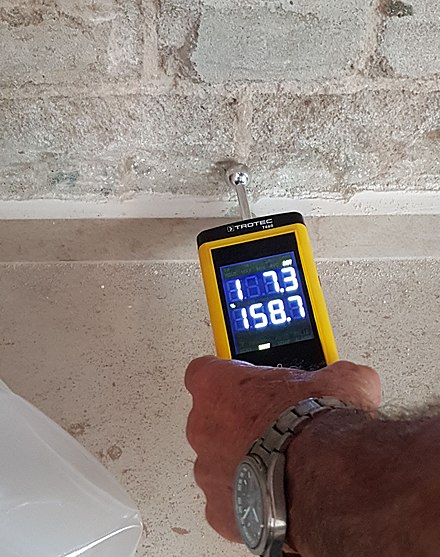Basement Moisture Testing is absolutely necessary in order to ascertain that there is not a hidden water accumulation that can  be hazardous to your home and family. The presence of excess moisture is always a bad idea as it can affect the structural integrity of your home and ultimately can result in the premature rotting out of certain floor materials or even cause the foundation of your home to deteriorate.
be hazardous to your home and family. The presence of excess moisture is always a bad idea as it can affect the structural integrity of your home and ultimately can result in the premature rotting out of certain floor materials or even cause the foundation of your home to deteriorate.
For this reason, it is advisable that this important task should be performed at regular intervals by yourself or competent professionals in order to save you from potentially harmful repercussions. Basement Moisture Testing should be done using the latest moisture meters, which are capable of precisely measuring the moisture content in the air or concrete of your basement, including basements under ceilings and walls. There are quite a number of such moisture meters available in the market today, and basement moisture testing through these meters is highly recommended for all homeowners to use.
There are several options when it comes to meters for reading basement moisture:
- RH Meters test the relative humidity (RH) in the air or substrates of the basement. High Relative Humidity may indicate that further testing is needed.
- Pin Meters measure the electrical resistance between pins that are in contact with building material. Because water is a great electrical conductor, the more moisture is present, the lower the electrical resistance.
- Pinless Meters send electromagnetic waves through building materials and then determine moisture content by the amount of distortion of the waves produced by the presence or lack of water.
Moisture meters usually come with very easy-to-understand instructions that walk you through the entire process of testing your basement. This way, no professional is required to go through the tedious process of conducting the basement moisture tests one by one.
Also, it saves time for the homeowner because he does not have to spend long hours measuring and monitoring the changes in the relative humidity in the air. Most of these relative humidity meters also have an automatic shut-off feature so that they can be turned off immediately if the room or area where they are installed begins to dry out.
Basement Moisture Testing is very critical for basements during periods of high seasonal rainfall because basements are generally located below ground level. During such times of heavy rainfall, excess moisture will pool up in the basement. This excess moisture then causes the walls, floors, and ceiling of the basement to seep water which can cause damage and produce mold and mildew.
Most homes in the United States possess basement waterproofing systems. These systems are installed to prevent any occurrence of the above-mentioned flooding incidents in the basements. Water comes into the basement via porous building materials, cracks, and drains.
Basement Moisture Testing can be conducted by professional companies to test the overall condition of the basement walls and the other areas where excess moisture might accumulate, like ceiling and flooring.
Basement Moisture Testing is essential for determining the root cause of the excessive dampness in the basement. Once the root causes have been identified, appropriate action can be taken to remedy the situation. Basement Moisture Testing is a serious task because if the water is not removed soon enough, it can lead to a number of major risks like mold growth inside the walls, cracks, and moisture seepage, which can lead to health hazards.
Basement Moisture Testing should also be conducted regularly to keep your basement dry at all times. If moisture persists even after DIY Basement Moisture Testing is conducted, then it may be wise to hire a professional company for proper advice.
The SANI-TRED Solution
The SANI-TRED Waterproofing system repairs and waterproofs all kinds of basements permanently. Transform your dingy, moldy basement in to a comfortable living space with our easy to use DIY waterproofing system.
